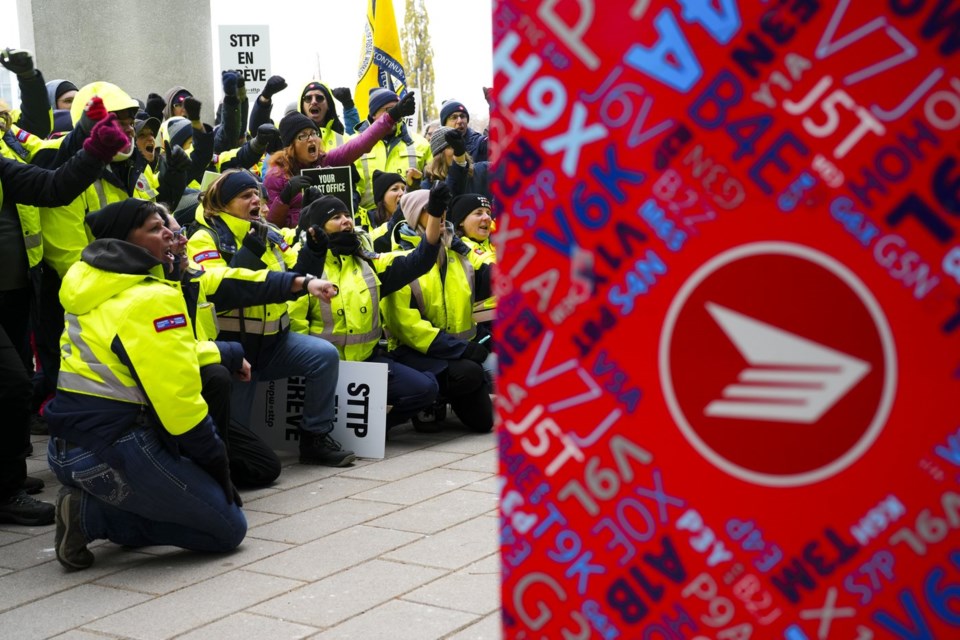Mail could begin moving again in Canada as early as next week after the federal government moved Friday to end the nearly month-long work stoppage at Canada Post.
Labour Minister Steven MacKinnon referred the dispute to the Canada Industrial Relations Board, with the aim of ordering the nearly 55,000 workers back to work and extending their current contract until May 22, 2025 — if the board determines a deal isn't within reach before the end of the year.
In the meantime, MacKinnon said he will appoint an industrial inquiry commission to look into the bargaining issues and come up with recommendations by May 15 on how a new agreement can be reached.
"We're calling a time out," MacKinnon told a news conference in Ottawa.
"Suffice to say positions appeared to have hardened and it became clear to me we were in a total impasse."
A federally appointed mediator withdrew themselves two weeks ago, saying at the time the two sides were too far apart to make a deal.
MacKinnon said since then, the negotiations have been "going in the wrong direction."
Ottawa used section 107 of the Labour Code to make its move Friday, after using the same powers to intervene earlier this year in disputes at the country's railways and ports, directing the board to order workers back to work and to order binding arbitration.
It's a move that sparked legal challenges from the unions involved and that labour experts and advocates have said erodes workers' bargaining rights.
This time, the government's use of section 107 is "more restrained," said Alison Braley-Rattai, an associate professor of labour at Brock University.
Business groups have been calling on the government to intervene — though Canada Post did not. Up until Friday MacKinnon insisted intervention wasn't in the cards.
But despite the wait, Braley-Rattai said she isn't surprised the government ended up stepping in.
"It has been going on for a very long time," she said of the dispute.
MacKinnon called the decision a creative solution by not sending the matter directly to binding arbitration — as the government did in the disputes at the railways and ports.
He said this doesn't mean a deal will be automatically in reach by May, but hoped the inquiry can show a path forward that works for both Canada Post and its workers.
"There are major structural changes in that industry that have to be accounted for," he said.
"There are workers' aspirations in that industry that have to be accounted for. Those have proved to be interests that are tough to reconcile. So I'm looking to try and triage those issues."
The postal workers' union denounced the decision, calling it "an assault" on the right to collective bargaining.
"This order continues a deeply troubling pattern in which the government uses its arbitrary powers to let employers off the hook, drag their feet, and refuse to bargain in good faith with workers and their unions," the Canadian Union of Postal Workers said in a statement.
Canada Post workers who were gathered outside a delivery centre east of Toronto on Friday morning expressed mixed feelings about the news.
Striking worker Kirk Gonnsen said he feels workers were let down by Canada Post and the government, but he's happy that workers struggling to pay their bills will be able to earn some money again.
Union member Denise Caster accused Canada Post of not being willing to engage in "good faith" talks.
"I want to get back to work, we all want to get back to work," she said. "We were hoping to get back to work with a fair negotiated contract."
Canada Post said it's reviewing the details of the announcement and that it looks forward to getting back to work.
It added its commitment has always been to reach negotiated agreements.
The Canadian Federation of Independent Business welcomed the move. It estimates small businesses have been losing a combined $100 million every day.
"This will be too late to salvage any of the Christmas holiday season for small businesses," CFIB president Dan Kelly said in a statement.
"With a massive backlog, it will be nearly impossible for any new shipments to make it to Canadians before Christmas through Canada Post."
Kelly said the resumption of mail will help businesses waiting for cheque payments from customers. He said lack of mail delivery has made it hard for small businesses to pay their bills.
MacKinnon acknowledged the effect on small businesses and remote communities, as well as on passport deliveries, immigration paperwork, and health cards. He said there are 50,000 permanent resident cards yet to be mailed, 190,000 passports, and the Canada Revenue Agency is holding more than 1.65 million pieces of secure correspondence.
— With files from Sharif Hassan in Toronto.
This report by The Canadian Press was first published Dec. 13, 2024.
Nick Murray and Rosa Saba, The Canadian Press




